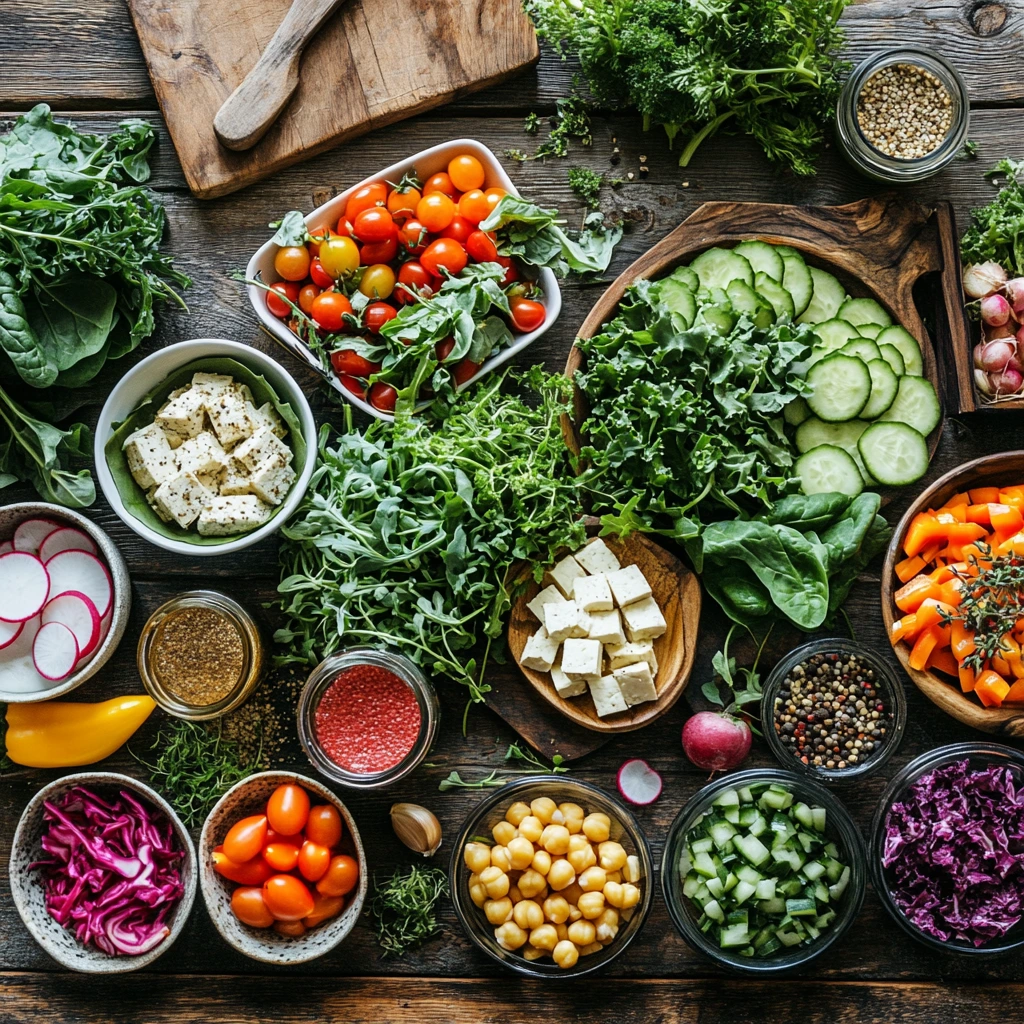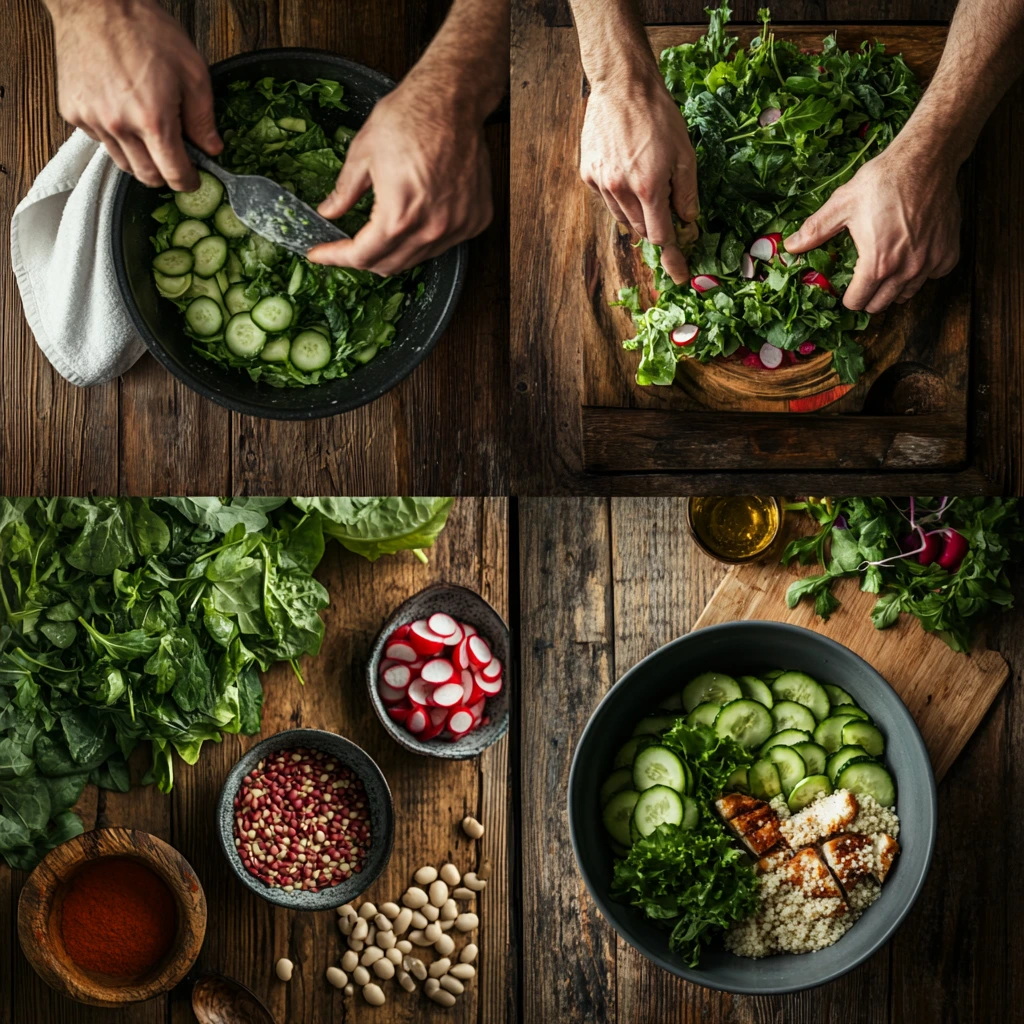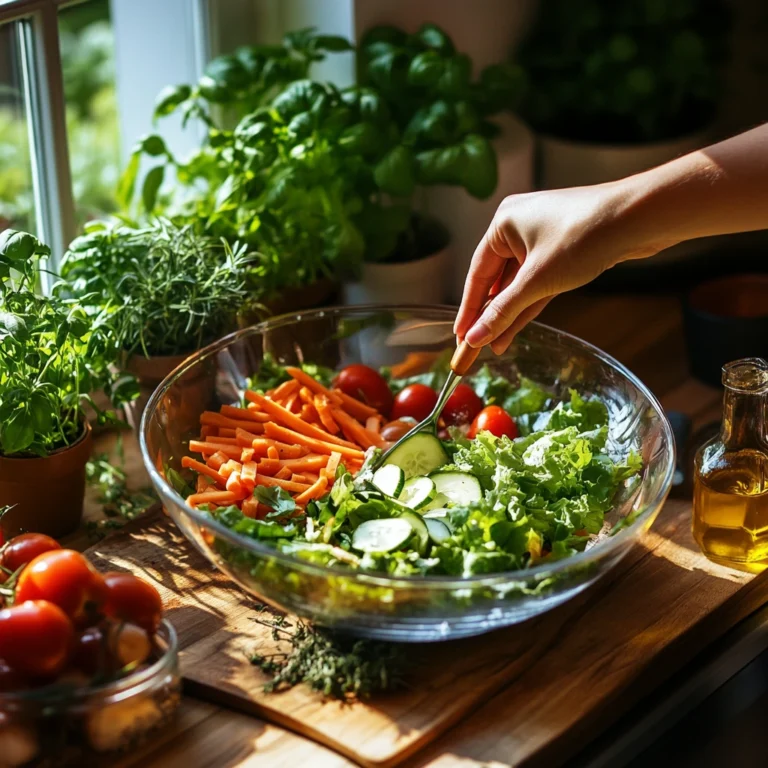Introduction
Are you looking for a refreshing, colorful, and healthy dish that’s perfect for any season? If so, look no further than Garden Patch Salad! Indeed, this delightful recipe brings together the crunch of fresh vegetables, the tangy flavors of dressings, and the adaptability to suit anyone’s taste. Whether you’re a health lover or simply a fan of good food, this salad truly offers something special. In this article, we’ll not only explore its ingredients but also show you how to make it and share creative twists to craft the perfect Garden Patch Salad every time.
Table of contents
Introduction to Garden Patch Salad
Definition and Overview
A Garden Patch Salad is not just a dish; rather, it’s a celebration of the freshest vegetables and simple ingredients. Typically, it includes a mix of leafy greens, crunchy vegetables, and colorful toppings, all brought together with a tasty dressing. In addition, the name itself brings to mind a thriving vegetable garden, making it an excellent choice for those who enjoy meals made with fresh produce.
Also, this salad is more than just a side dish. With a few changes, it can be turned into a hearty meal by adding proteins, grains, or beans. Even better, its simple nature makes it easy to like, while its versatility allows for endless creativity. No matter the season, you can adjust the ingredients to match what’s available and what you enjoy, making sure it always fits your preferences.
Historical Background
The idea of mixing vegetables like the Garden Patch Salad isn’t new. It is rooted in the tradition of using local produce, which has made this type of salad popular for centuries. For example, from ancient Greek and Roman cooking to modern fresh food movements, people have always celebrated the produce from their gardens. As a result, the Garden Patch Salad continues to honor this tradition by showing off nature’s best in a bowl.
With such a rich history, this salad has grown to include global influences, adding ingredients like quinoa, chickpeas, or avocados for a modern twist. Whether you stick to the classic version or try new bold flavors, you’re part of a tradition that’s all about enjoying fresh, simple food.
Stay tuned as we delve deeper into the core ingredients and how to prepare the ultimate Garden Patch Salad!
Key Ingredients of Garden Patch Salad
When making the perfect Garden Patch Salad, the ingredients you choose play an important role. Not only does each part add flavor, texture, and health benefits, but it also contributes to creating a dish that pleases every taste bud. Moreover, from fresh vegetables to hearty proteins and tangy dressings, this salad is as flexible as it is tasty. Therefore, let’s break it down step by step to ensure the perfect combination of flavors and textures.
Fresh Vegetables
The heart of a Garden Patch Salad lies in its vegetables, which bring a burst of freshness and color to your plate.
Proteins
Whether you prefer plant-based options or lean animal proteins, adding a protein source can transform your salad into a satisfying meal.
- Plant-Based Proteins: To begin, chickpeas, black beans, or tofu are excellent choices. Not only are they rich in fiber and protein, but they also help keep you full longer. Moreover, you can sprinkle in some edamame or lentils for an extra protein-packed punch.
- Animal-Based Proteins: On the other hand, grilled chicken, boiled eggs, or poached salmon complement the vegetables beautifully. Additionally, shredded turkey or even a handful of grilled shrimp can take your salad to the next level, adding both flavor and texture.
Grains and Legumes
For added heartiness, toss in some grains or legumes.
- Common Choices
Quinoa, farro, or brown rice are popular grains that add a chewy texture. Lentils or black-eyed peas also pair well, blending seamlessly with fresh produce.
Dressings and Seasonings
The dressing ties everything together, while seasonings add depth and complexity.
- Popular Dressings: To start, classic vinaigrettes, creamy avocado dressings, or tangy lemon tahini are excellent options. Additionally, a light drizzle of olive oil with balsamic vinegar serves as another timeless choice, perfect for any occasion.
- Herbs and Spices: Moving on, fresh herbs like parsley, basil, or cilantro add a fragrant touch to the salad. Furthermore, seasonings such as garlic powder, paprika, or crushed black pepper elevate the flavors, ensuring every bite is unforgettable.
With these ingredients, your Garden Patch Salad will be a symphony of tastes and textures, perfect for any occasion.

A colorful and artistic arrangement of fresh items ready for making a delicious garden patch salad, including vibrant vegetables, herbs, and plant-based proteins.
How to Prepare Garden Patch Salad
Now that you’ve gathered your fresh, colorful ingredients, it’s time to put together your Garden Patch Salad. Preparation is simple, but a few careful methods can make a big difference in the final result. Let’s dive into the steps and some expert tips for making a salad that’s as tasty as it is beautiful.
Step-by-Step Preparation
Creating the perfect Garden Patch Salad is simple and rewarding when you follow these steps:
- Wash and Prep the Vegetables
Rinse all vegetables well under cold water to remove any dirt or leftovers. Dry them with a clean kitchen towel or use a salad spinner for leafy greens. - Chop and Slice
Cut vegetables into even pieces for a neat look and easier eating. Leafy greens can be torn into small pieces, while root vegetables and others should be thinly sliced or cut into strips for the best texture.. - Prepare the Proteins and Grains
To begin, if you’re using grilled chicken, beans, or quinoa, cook them ahead of time and let them cool. By doing so, you ensure these elements blend seamlessly into the salad without wilting the greens. - Assemble the Salad
Next, start with the leafy greens as the base. After that, add the chopped vegetables, placing them evenly for a nice-looking mix. Then, add your proteins and grains, spreading them across the bowl for even bites and a pleasing final dish. - Dress and Toss
Just before serving, drizzle your chosen dressing over the salad. Use a pair of salad tongs to toss everything gently, ensuring the dressing coats every ingredient without crushing the greens.

Tips for Freshness and Flavor
To elevate your salad-making skills, keep these handy tips in mind:
- Use Fresh, Seasonal Ingredients
Seasonal produce not only tastes better but also supports local farmers and reduces your environmental footprint. - Balance the Flavors
Include a mix of sweet (cherry tomatoes), tangy (vinaigrette), salty (feta cheese or nuts), and bitter (arugula) elements for a well-rounded dish. - Add the Dressing Last
Dressing the salad right before serving keeps the greens crisp and prevents sogginess. If storing leftovers, keep the dressing separate. - Experiment with Textures
Combine crunchy veggies, tender grains, and creamy dressings to make each bite exciting. Adding nuts or seeds like sunflower or pumpkin seeds can introduce a delightful crunch.
With these steps and tips, preparing a Garden Patch Salad is as enjoyable as eating it.
Nutritional Benefits of Garden Patch Salad
One of the best things about Garden Patch Salad is that it’s not just delicious but also incredibly nutritious. Packed with a variety of fresh, wholesome ingredients, this salad provides a powerful boost to your daily nutrient intake while keeping your meals light and healthy. Let’s take a closer look at the nutritional aspects.
Nutritional Content of Garden Patch Salad (Per 100g)
Below is the nutritional content for a typical Garden Patch Salad, based on an average recipe containing a mix of fresh vegetables, grains, and proteins. However, values may vary depending on the specific ingredients used. Therefore, it’s important to adjust the calculations based on your chosen components for a more accurate nutritional profile.
| Nutrient | Amount (per 100g) | % Daily Value* |
|---|---|---|
| Calories | 75 kcal | 4% |
| Protein | 3 g | 6% |
| Fat | 2 g | 3% |
| Saturated Fat | 0.3 g | 2% |
| Carbohydrates | 10 g | 3% |
| Fiber | 3 g | 12% |
| Sugars | 3 g | — |
| Vitamin A | 3500 IU | 70% |
| Vitamin C | 20 mg | 33% |
| Calcium | 40 mg | 4% |
| Iron | 1.5 mg | 8% |
Macronutrient Breakdown
At its core, a Garden Patch Salad is rich in essential macronutrients:
- Carbohydrates: To start with, vegetables like carrots, cucumbers, and tomatoes supply natural, energy-boosting carbs. Moreover, grains like quinoa or farro add complex carbohydrates that keep you fuller longer.
- Proteins: Next, proteins from beans, tofu, or grilled chicken make this salad a complete meal. These options support muscle health and overall body function.
- Fats: Finally, dressings made with olive oil or avocado contribute healthy fats that are vital for brain health and energy.
Vitamins and Minerals
Each ingredient contributes its unique array of vitamins and minerals:
- Leafy greens: In particular, they are loaded with vitamin K, vitamin C, and folate, which support strong bones and a robust immune system.
- Root vegetables: Additionally, they are rich in antioxidants, beta-carotene, and potassium, promoting heart health and glowing skin.
- Other vegetables: For example, cherry tomatoes and cucumbers provide hydration and vital nutrients like lycopene and silica, enhancing overall wellness.
Health Benefits
A Garden Patch Salad is more than a tasty dish; it’s a health booster.
- Supports Weight Management: Low in calories and high in fiber, this salad helps you feel satisfied without overeating.
- Improves Digestion: Fiber-rich vegetables aid in digestion and promote gut health.
- Strengthens Immunity: A mix of fresh produce delivers antioxidants that help ward off illnesses.
Eating a Garden Patch Salad regularly is a simple yet effective way to prioritize your health.
Variations of Garden Patch Salad
The versatility of Garden Patch Salad therefore means you can adapt it to suit any season, culture, or personal preference. For example, with a few tweaks, this classic dish can easily become your favorite year-round go-to meal.
Seasonal Variations
Make the most of what’s fresh and available:
- Spring: To begin, add tender asparagus, peas, and radishes for a vibrant, crisp salad.
- Summer: Next, incorporate juicy watermelon chunks, sweet corn, and fresh herbs like basil to highlight the season’s flavors.
- Autumn: As the weather cools, include roasted squash, cranberries, and toasted pumpkin seeds to create a hearty, seasonal twist.
- Winter: Finally, use kale or spinach as a base, pairing it with roasted beets and citrus segments for a pop of flavor and color during the colder months.
Regional Twists
Explore global flavors by experimenting with regional influences:
- Mediterranean: Add olives, feta cheese, and a lemon-oregano vinaigrette.
- Asian-Inspired: Use sesame dressing, shredded cabbage, and edamame for a vibrant fusion.
- Mexican: Incorporate black beans, avocado, and a spicy lime dressing.
Serving Suggestions
Enhance the experience with thoughtful serving ideas:
- Side Dish: Pair the salad with grilled chicken or fish for a balanced meal.
- Main Course: Add hearty proteins like tofu, beans, or grains to make it a standalone dish.
- Presentation: Serve in a large, shallow bowl for visual appeal. Add edible flowers or a sprinkle of seeds for a gourmet touch.
Moreover, these variations ensure your Garden Patch Salad never gets boring, no matter how often you make it. Up next, we’ll answer some of the most common questions about this beloved dish!
FAQs about Garden Patch Salad
Are you curious about Garden Patch Salad? If so, here are some frequently asked questions to help you understand and enjoy this fresh, versatile dish. With these answers, you’ll be ready to make the most of its endless possibilities.
What is Garden Patch Salad?
Garden Patch Salad is a wholesome dish that features a mix of fresh vegetables, grains, and proteins. Additionally, it is known for its vibrant colors and customizable nature, making it easy to tailor to any season or dietary preference. As such, it’s both a nutritious and delicious addition to any meal.
How do you make Garden Patch Salad?
Making a Garden Patch Salad is simple! Start by washing and prepping your vegetables. Arrange leafy greens as a base, then layer crunchy veggies, proteins, and grains. Finally, drizzle with your favorite dressing and toss gently to combine. Serve fresh for the best taste.
What are the nutritional benefits of Garden Patch Salad?
This salad is packed with vitamins, minerals, and fiber. For instance, leafy greens provide vitamin K and iron, while root vegetables offer antioxidants. Furthermore, proteins and grains add essential nutrients like amino acids and complex carbs, thereby making it a well-rounded, healthful meal.
Can I customize the ingredients in Garden Patch Salad?
Absolutely! The beauty of Garden Patch Salad lies in its adaptability. For instance, you can swap out ingredients based on seasonal availability, dietary preferences, or personal taste. Whether you’re looking for a vegan twist or a protein-packed variation, the possibilities are truly endless. As a result, this salad can easily be tailored to suit any occasion or preference.
What dressings pair well with Garden Patch Salad?
Popular choices include vinaigrettes made with olive oil and lemon, creamy avocado dressings, or even tangy tahini blends. A light balsamic drizzle also complements the natural sweetness of the vegetables.
How should I store leftover Garden Patch Salad?
To keep your salad fresh, first, store it in an airtight container in the refrigerator. Additionally, if possible, keep the dressing separate and add it just before serving. This way, you can prevent the greens from becoming soggy and maintain their crispness.
Conclusion
Recap of Key Points
The Garden Patch Salad is a versatile, nutrient-packed dish that highlights the best of fresh, wholesome ingredients. Moreover, with its endless customization options and exceptional nutritional benefits, it’s a delightful choice for any meal. Whether you’re seeking variety or health benefits, this salad has something for everyone.
Encouragement to Try the Recipe
Now that you’ve learned how to create the perfect Garden Patch Salad, it’s time to put your own spin on it. Grab your freshest vegetables, get creative with dressings, and enjoy a bowl of this refreshing, healthy dish today!
What does a garden salad contain?
A garden salad typically contains fresh vegetables such as lettuce, cucumbers, tomatoes, carrots, and onions. It may also include additional toppings like croutons, cheese, or dressing, depending on personal preferences.
What is the Jennifer Aniston salad?
The Jennifer Aniston salad is a popular dish attributed to the actress. Generally, it is made with ingredients like bulgur, cucumbers, parsley, mint, red onion, garbanzo beans, feta cheese, and a simple lemon-olive oil dressing. Consequently, it has gained fame as a healthy, refreshing, and nutrient-rich option that appeals to a wide audience. In addition, its simplicity makes it easy to prepare and enjoy regularly.
How do you plant salad patches?
To plant salad patches, first, start by selecting a sunny spot with well-drained soil. Next, prepare the soil by loosening it and adding compost. Then, sow seeds of salad greens like lettuce, spinach, or arugula in rows or clusters, lightly covering them with soil. Finally, water regularly to keep the soil moist and harvest when the leaves reach the desired size.
What is in the garden salad at Chick-fil-A?
The garden salad at Chick-fil-A includes a mix of fresh greens such as romaine lettuce, mixed baby greens, and shredded red cabbage. It is topped with grape tomatoes, a blend of Monterey Jack and cheddar cheeses, and served with your choice of dressing.

